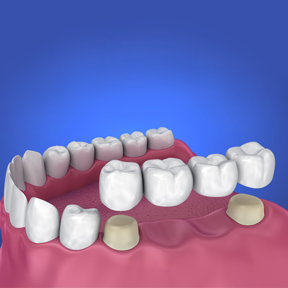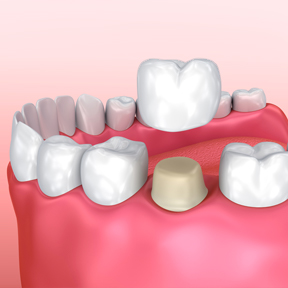Crowns & Bridges
Crowns & Bridges
If you are missing a tooth or more than one tooth, you are well aware of the importance of a full compliment of teeth, working together, to provide proper chewing ability as well as to add to your overall appearance. When you are missing teeth, it can often be difficult to speak, chew, and smile. You can restore your smile, chewing ability, and overall oral health with a fixed bridge. With help from our in-house dental laboratory we help shorten wait times and maximize accuracy and personalization throughout the process with no need to send out cases.Bridges
A bridge (also called a fixed partial denture) is a restoration, which replaces or spans the space where one or more teeth have been lost. There are two types of bridges – fixed and removable. Fixed bridges are bonded into place and can only be removed by a dentist. On the other hand, you can take out a removable bridge for cleaning. Removable bridges, while less expensive, may not be as desirable as fixed bridges and are not generally as stable.Long-Term Dental Health
Bridges help maintain the natural shape of your face and may help support your lips and cheeks. The loss of a back tooth may cause your mouth to sink and your face to look older. Teeth are designed to complement each other, so when a tooth is lost, the nearby teeth may tilt toward the empty space, or the teeth in the opposite jaw may move up or down toward the space. This places unusual stress on both the teeth and tissues in your mouth and a bridge is required for overall dental health. With missing teeth, gum tissues and the bone that hold teeth in place can break down, increasing the risk of gum disease. Teeth that have tipped are difficult to clean, making them more likely to decay. As a result, even more teeth may be lost.How Crowns & Bridges Work Together
A fixed bridge is commonly cemented to the natural teeth next to the space left by the missing tooth. A false tooth (called a pontic) replaces the lost tooth. The pontic is attached to the crowns (restorations that cover a tooth). Crowns, which are cemented onto the natural teeth, provide support for the bridge. In some instances, a resin-bonded bridge, frequently called a “Maryland Bridge,” can be used to replace one or more missing teeth. Because the bridge is attached by a special procedure called bonding, it doesn’t require the use of crowns or extensive tooth preparation. Your specialist can determine whether this treatment method is appropriate for you.What To Expect
Dental bridges can be made from various materials including gold, precious alloys, porcelain, zirconia, or a combination of these materials. Your specialist will discuss with you which materials are best for your unique needs. It is imperative that you keep your remaining teeth in optimal health. This can be done by brushing your teeth at least twice a day and cleaning between your teeth with floss or interdental cleaning products. A visit to your dentist at least twice a year is imperative to proper oral health maintenance. The success of your dental bridge depends on its foundation.



Call 412.621.0200 or email office@dentalpgh.com
today for an appointment
